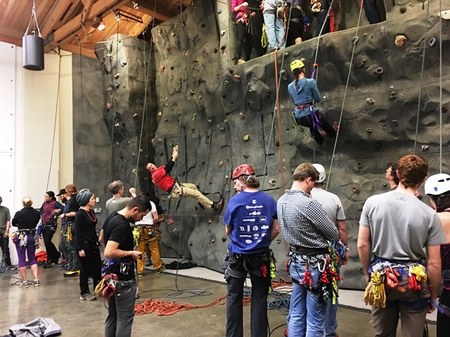
OPEN CLIMB HOST
Two climbers attended Friday Open Climb Night to practice Basic course techniques in preparation for a Basic Equivalency Evaluation, scheduled for November 3.
They were working mostly on the floor, I saw them practicing belay tie off and belay escape. They may have done some climbing, but probably not a lot.
Sometime near 8pm (a rough guess) one of the climbers came over to me to say that his friend was having difficulties and that he was going to call 911, which he did.
The ill climber was sitting in a chair at the time. He was helped to the floor to lay down shortly after.
Several of us went out to guide the responding Seattle firefighters and paramedics in. The firefighters took charge and asked us (myself and the four other Open Climb Night climbers) to leave the room, which we did.
Eventually, the four Open Night climbers returned, quietly, to retrieve their gear, and headed to the basement climbing area. As far as I could tell, the ill climber was always conscious and able to communicate, at some level, during the entire episode.
Eventually, an ambulance was called and the ill climber was transported. The paramedics had not resolved what the issue was but they wanted to be conservative about what they did.
I talked to the Seattle Fire responders for a couple of minutes, mainly about The Mountaineers and the program center, then they left. That was the end of Open Climb Night for the evening, and we turned the room over to the mushroom people who were slowly and impressively taking the whole place over for their festival the next two days.
Two questions came up:
- Should we have a defibrillator device at the program center? I thought that we did have one, but we don't.
- Is there some place by the front door where we can post our address, in big letters, so someone calling 911 can read it off to be sure that what the say is the 100% correct address? It is amazing how un-rememberable our address is when someone is calling 911!
KING COUNTY EMS MEDICAL DIRECTOR (and Mountaineer member)
I am a strong advocate for AEDs to be placed in all public places with at risk persons. Clearly most Mountaineers at the Program Center are young, but lets face it, there are a few aging Mountaineers. Plus many evening events have senior people in attendance. I am very happy to advise about which device to purchase.
The Philips defibrillator does not require a physician's oversight. As to inspections: there is no need for formal inspections as the device beeps if the battery is low. Batteries and pads are generally good for two-three years. Formal defib training is not required but I am happy to give the staff a 15 minute introduction on how and when to use it.
I think the best location should be somewhere in the lobby.
Though Seattle Fire is only minutes away, remember every minute saved from collapse to the first shock increases the likelihood of survival by 10%.
FOLLOW UP (Feb 2016)
A defibrillator has been ordered for the Seattle Program Center and should be operational shortly. There is a plan for regularly checking the batteries. The Tacoma Program Center will be next.
 David Shema
David Shema